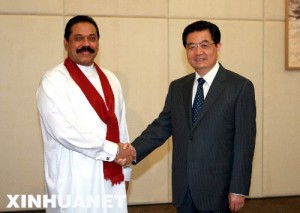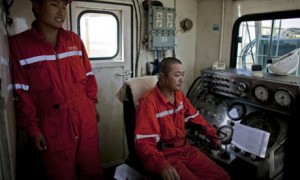Can China bring stability to conflict-ridden states?
As the west’s influence wanes, China’s influence in some of the world’s most turbulent countries is on the rise – and having a significant impact
Saferworld’s Ivan Campbell kicked off a panel discussion on Thursday about China’s role in conflict-affected countries with a quote from a government official in South Sudan. “If a man is thirsty, he needs to drink, no matter where the water comes from. China is ready to do things straight away … when the west gives some small money, they want to handle it very carefully. While they are thinking what to do, China will come in.”
This, says Campbell, is a pithy summation of the changing dynamics of development in many conflict-affected countries across Africa. As the west’s influence wanes, China’s influence in some of the world’s most turbulent countries is on the rise.
The panel debate, hosted by the All Party Parliamentary Group on Global Security and Saferworld, discussed the findings from a new Saferworld report into how China could be affecting fragile peace and stability in conflict-affected states.
The report is based on field research Saferworld conducted in Nepal, Sri Lanka, Sudan and South Sudan. It
characterises Chinese engagement in these states as a top-down model of stability, with China often providing military assistance and arms to host governments and interested in maintaining stable bilateral relations, only intervening when it’s vital interests are threatened.
Yet despite this policy of non-interference, China’s increasingly dominant presence is inevitably having a significant impact on stability and “conflict dynamics” in these countries.
In the report, Saferworld outlines how this played out in the 2009 Sri Lankan civil war. “In recent years China has become the largest development financier and arms supplier to the government of Sri Lanka. After they had long backed a peace agreement, western states openly questioned the conduct of Sri Lanka’s 2009 military campaign that defeated the Liberation Tigers of Tamil Eelam (LTTE), leading to cuts in aid, restricted arms sales and calls for an international investigation into alleged war crimes. If such concerns existed in Beijing, they were muted: Sri Lanka’s conflict was an internal matter. Loans, arms and diplomatic backing continued.”
The report also highlights the fact that when China decides to put pressure on governments to pursue peace – such as on occasion in the case of Sudan and South Sudan – the results have been broadly positive.
One of its main points is that if China and the west worked hand-in-hand to apply diplomatic and economic pressure in a co-ordinated way, they could have a strong chance of helping build relations and consolidate fragile peace. Unfortunately, the report also highlights a complete lack of communication between Chinese and western officials. “It’s like we operate in parallel universes: they do what they do, we do what we do,” says one western diplomat quoted.
According to panel member Dr Xiao Yuhua, from the Institute of African Studies at the Zhejiang Normal University in China, Beijing’s approach to conflict-affected countries is evolving.
Speaking to me after the debate, he said events such as the kidnap of 29 road construction workers in Sudan in January creates domestic problems for China and underlines the risks of sending workers into some of the world’s most unstable areas without working to create a lasting safe and peaceful environment.
“The fact is that China has to protect its own human as well as commercial interests in Africa,” he said. “Attacks on Chinese workers and companies are increasing. China will always pursue a policy of non-intervention in sovereign affairs but I also think it is realising that to pursue commercial interests in areas of conflict, stability has to be encouraged in a way that will create a safe environment for everyone working and living there. I think we will begin to see more of an emphasis on governance.”
He also said that as the west’s leverage lessens, it will have to better understand the mindset that drives and moulds China’s development work in Africa.
“The thing that is misinformed about China and Africa is that China’s presence in these countries is not imposed on these governments, it is rather a reflection of the development agenda of the countries themselves,” Yuhua said. “China does not have a values-driven approach to development like the west, but we understand the desire to develop and open up to new markets. There is a cultural misunderstanding there that must be addressed if there is going to be greater co-operation between all players in the future.”
Many audience members at Thursday’s discussion raised the issue of China’s chequered human rights and environmental record, and its impact on local communities when it comes to its overseas development projects. Yuhua said he believed Beijing had started to take notice of the criticism and demand more accountability from its private sector partners.
The catch is China’s issues with actually enforcing these standards on the ground – a problem that is likely to cause Beijing increasing problems if it doesn’t find a way to reconcile its commercial ambitions with ensuring a safe and peaceful reception for the growing number of Chinese companies and workers in conflict-affected countries across the world.
See original article here


